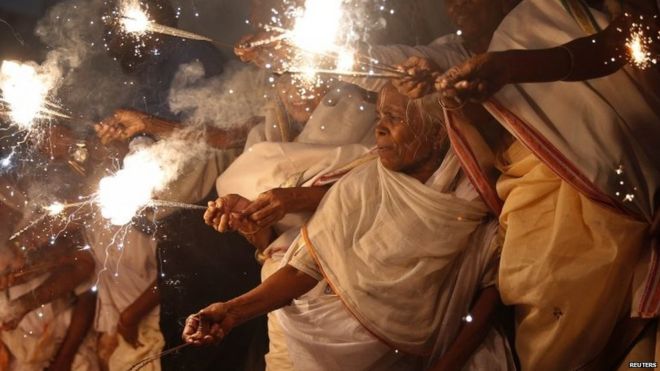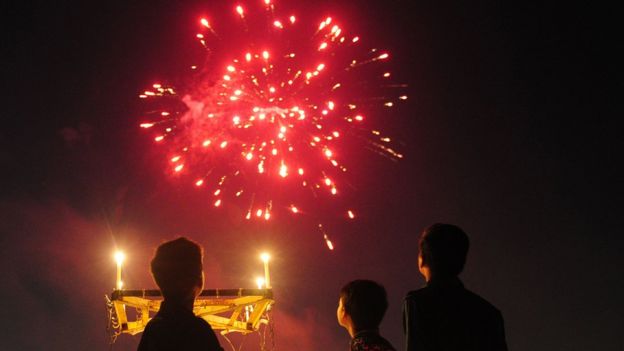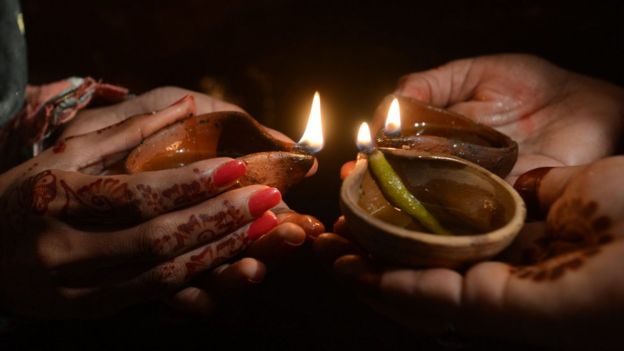 REUTERS
REUTERS
It was meant as a way to tackle air pollution - but it ended up as the subject of a fierce online debate about religion.
India's supreme court banned selling firecrackers during Diwali, igniting an uproar as some saw the ban as an attack specifically on Hinduism's biggest festival.
Chetan Bhagat, the writer behind Bollywood blockbusters 2 States and 3 Idiots, sparked a massive debate after pumping out a series of tweets objecting to the ban to his more than 10 million followers.
Others, however, were hopeful that the ban would alleviate worsening air pollution levels.
On Twitter, the hashtag #Right2Breathe began circulating in response, and had nearly seven thousand tweets by commenters on both sides of the debate.
 GETTY IMAGES
GETTY IMAGESYou might also be interested in:
- The online bots behind Vladimir Putin's birthday wishes
- 'Husband-proof' shopping list goes viral
- Follow BBC Trending on Facebook
For Sanjay Dixit, a secretary to the government of Rajasthan in Jaipur, India, the ban is "an avoidable overreach."
"Are we going to learn culture from time-honoured practices, or be taught by the courts?" Dixit said. "With Indians, education with a little regulation, such as regulating excessively noisy crackers, would definitely have worked better."
But, for those living with respiratory conditions or households with young children, the ban on fireworks makes perfect sense.
Pallavi Pratap, an lawyer who argues in front of the Supreme Court of India, told Trending that she saw the ban as a "small sacrifice" for a cleaner environment.
Pratap herself was nearly blinded and permanently scarred after a firework accident on Diwali years ago. Firecrackers, she said, leave her "terrified."
"Bursting crackers is not the only tradition to uphold," Pratap said. "[My niece] suffers from respiratory problem and especially around Diwali, she requires a nebuliser to be able to breathe."
What are the details of the ban?
- The Indian Supreme Court upheld a ban on the sale of firecrackers in the capital region until November 1 in an effort to control air pollution levels
- Last year's Diwali resulted in a threefold increase in dangerous particulate matter for days after
- The Delhi metropolitan area makes up nearly 25% of the total firecracker market in India
- According to the Economic Times, the ban could result in Rs 1,000 crore (£125m, $165m)
- The courts rationalized that Diwali "can be celebrated with equal fervour by various other means as well"
How connected are fireworks and Diwali?
On Twitter, many users, including Chetan Bhagat, likened the ban on Diwali firecrackers to outlawing Christmas trees on Christmas.
According to Ankur Barua, a Hindu studies professor at the University of Cambridge, aside from traveller accounts in the 1200s about an Indian "phenomenon of rows of lights," it is difficult to say how the festival looked in the past.
"We don't have any records saying how [Diwali] was being celebrated," Barua said. "It's also different in North and South India."
He added that the use of fireworks in the last 50 years is largely a "North Indian phenomenon."
Some Twitter users, including journalist Prema Bakshi, pointed to the relatively recent holiday firework phenomenon to argue for the ban.
But Vasudha Narayanan, distinguished professor of religion at the University of Florida, agreed with the Christmas tree analogy, saying that Hinduism is a religion of constant change and assimilation.
"The Christmas tree has nothing to do with the birth of Christ, it's a much later pagan custom that snuck in - and so did the fireworks," Narayanan said.
"This has become a way in which we understand the festival, like a Christmas tree, or Thanksgiving with turkey... fireworks have become a very important part of the imagination and understanding of [Diwali] all over the world."
Raising environmental concerns
Voices across the political spectrum, including Shekhar Gupta, founder of liberal news site ThePrint, have spoken out against the ban, saying it does not properly address any environmental concerns.
Sankrant Sanu, a technology entrepreneur who lives in Seattle in the United States and Gurgaon in India, was one of those opposed.
Sanu told BBC Trending in an email that the blanket ban felt "disproportionate."
"It is lifted in time for Christmas and New Years, so it's not a firecracker ban but a Diwali ban," he said.
"I've been a strong environmental voice. I'm vegetarian—meat is one of the biggest factors in global warming. I also have driven an electric car for nearly 4 years. But Delhi's air pollution has little to do with firecrackers."
 AFP
AFP
The group Air Quality Index consistently lists Delhi's air as "very unhealthy," using a range of official statistics.
At this level, the entire population is affected, and health professionals recommend that children and those with respiratory disease spend no time outside.
These conditions worsen in winter months, according to data from the Delhi Pollution Control Committee, as cooler air traps smog closer to ground level.
Blog by Ritu Prasad
You can follow BBC Trending on Twitter @BBCtrending, and find us on Facebook. All our stories are at bbc.com/trending.
No comments:
Post a Comment